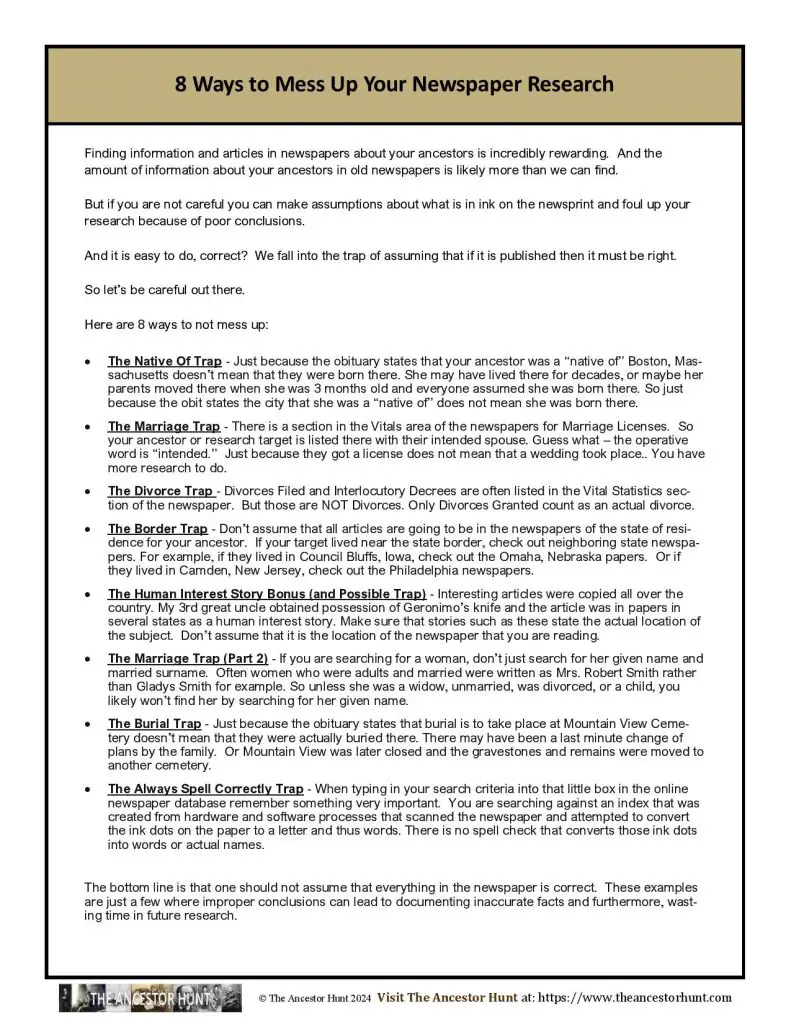
(This page's most recent update is October 2024)
Finding information and articles in newspapers about your ancestors is incredibly rewarding. And the amount of information about your ancestors in old newspapers is likely more than we can find.
But if you are not careful you can make assumptions about what is in the ink on the newsprint and foul up your research because of poor conclusions.
And it is easy to do, correct? We fall into the trap of assuming that if it is published then it must be right. So let’s be careful out there.
Here are 8 ways to not mess up:
The Native Of Trap – just because the obituary states that your ancestor was a “native of” Boston, Massachusetts doesn’t mean they were born there. She may have lived there for decades, or maybe her parents moved there when she was 3 months old and everyone assumed she was born there. So just because the obit states the city that she was a “native of” does not mean she was born there.
The Marriage Trap – There is a section in the Vitals area of the newspapers for Marriage Licenses. So your ancestor or research target is listed there with their intended spouse. Guess what – the operative word is “intended.” Just because they got a license does not mean that a wedding took place.. You have more research to do.
The Divorce Trap – Divorces Filed and Interlocutory Decrees are often listed in the Vital Statistics section of the newspaper. But those are NOT Divorces. Only Divorces Granted count as an actual divorce.
The Border Trap – Don’t assume that all articles will be in the newspapers of the state of residence for your ancestor. If your target lived near the state border, check out neighboring state newspapers. For example, if they lived in Council Bluffs, Iowa, check out the Omaha, Nebraska papers. Or if they lived in Camden, New Jersey, check out the Philadelphia newspapers.
The Human Interest Story Bonus (and Possible Trap) – Interesting articles were copied all over the country. My 3rd great-uncle obtained possession of Geronimo’s knife and the article was in papers in several states as a human interest story. Make sure that stories such as these state the actual location of the subject. Don’t assume that it is the location of the newspaper that you are reading.
The Marriage Trap (Part 2) – If you are searching for a woman, don’t just search for her given name and married surname. Often women who were adults and married were written as Mrs. Robert Smith rather than Gladys Smith for example. So unless she was a widow, unmarried, divorced, or a child, you likely won’t find her by searching for her given name.
The Burial Trap – Just because the obituary states that burial is to take place at Mountain View Cemetery doesn’t mean that they were actually buried there. There may have been a last-minute change of plans by the family. Or Mountain View was later closed and the gravestones and remains were moved to another cemetery.
The Always Spell Correctly Trap – When typing in your search criteria into that little box in the online newspaper database remember something very important. You are searching against an index that was created from hardware and software processes that scanned the newspaper and attempted to convert the ink dots on the paper to a letter and thus words. No spell check converts those ink dots into words or actual names.
The bottom line is that one should not assume that everything in the newspaper is correct. These examples are just a few where improper conclusions can lead to documenting inaccurate facts and furthermore, wasting time in future research.
Download the Quicksheet PDF
To obtain the one-page Quicksheet pdf for easy reference on how to not screw up your newspaper research, you can download it by clicking on the Download button below:
For all the previously published Quick Reference Guides, click on QuickSheets.
Genealogy QuickSheets – Frequently Asked Questions
- 100 Best Free Online Genealogy Websites
- Beyond the Search Engine: Using Google Databases for Genealogy Research
- 64 Genealogy Items to Collect from Your Home
- United States Genealogical and Historical Societies
- 24 Places Where You Can Find Your Ancestors Occupation
- 13 Types of Genealogical Information You Can Find in Old Yearbooks
- 16 Places Where You Can Find Genealogy and Family History Books
- Easy Cousin Relationship Chart
- The Easiest Way to Find Every Historical Newspaper in America
- The Best Way to Find 20% More Pertinent Newspaper Articles Online